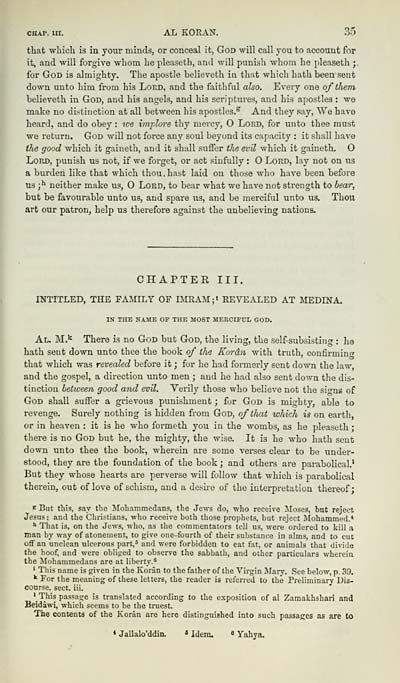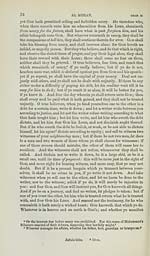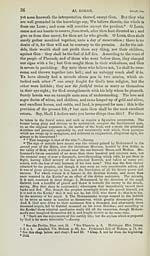Download files
Complete book:
Individual page:
Thumbnail gallery: Grid view | List view

CHAP. III. AL KORAN. 35
that which is in your minds, or conceal it, God will call you to accouut for
it, and will forgive whom he pleaseth, and wiU punish whom he pleaseth ;,
for God is almighty. The apostle believeth in that which hath been sent
down unto him from his Lord, and the faithful also. Every one of them
believeth in God, and his angels, and his scriptures, and his apostles : we
make no distinction at all between his apostles.^ And they say, We have
heard, and do obey : ive i?nplore thy mercy, O Lord, for unto thee must
we return. GoD wiU not foi'ce any soul beyond its capacity : it shall have
the good which it gaineth, and it shall suflFer the evil which it gaineth. O
Lord, punish us not, if we forget, or act sinfully : Lord, lay not on us
a burden like that which thou, hast laid on those who have been before
us ;^ neither make us, O Lord, to bear what we have not strength to bear,
but be favourable unto us, and spai'e us, and be merciful unto us. Thou
art our patron, help us therefore against the unbelieving nations.
CHAPTER III.
INTITLED, THE FAMILY OF IMRAM;> REVEALED AT MEDINA.
IN THE NAME OF THE MOST MERCIFUL GOD.
Al. M.^ There is no God but God, the living, the self-subsisting : ha
hath sent down unto thee the book of the Kordn with truth, confirming
that which was revealed before it ; for he had formerly sent down the law,
and the gospel, a direction unto men \ and he had also sent down the dis-
tinction between good and evil. Verily those who believe not the si<^ns of
God shall suffer a grievous punishment ; for God is mighty, able to
revenge. Surely nothing is hidden from God, of that which is on earth,
or in heaven : it is he who formeth you in the wombs, as he pleaseth ;
there is no God but he, the mighty, the wise. It is he who hath sent
down unto thee the book, wherein are some verses clear to be under-
stood, they are the foundation of the book ; and others are parabolical.'
But they whose hearts are perverse will follow that which is parabolical
therein, out of love of schism, and a desii-e of the interpretation thereof;
K But this, say the Mohammedans, the Jews do, who receive Moses, hut reject
Jesus ; and the Christians, who receive both those prophets, but reject Mohammed.*
'' That is, on the Jews, who, as the commentators tell us, were ordered to kill a
man by way of atonement, to give one-fourth of their substance in alms, and to cut
off an unclean ulcerous part,* and were forbidden to eat fat, or animals that divide
the hoof, and were obliged to observe the sabbath, and other particulars wherein
the IMohammedans are at liberty.*
' This name is given in the Koran to the father of the Virgin Mary. See below, p. 39.
^ For the meaning of these letters, the reader is referred to the Preliminary Dis-
course, sect. iii.
'This passage is translated according to the exposition of ai Zamakhshari and
Beidawi, which seems to be the truest.
The contents of the Koran are here distinguished into such passages as are to
* Jallalo'ddin. « Idem. 8 Yahya.
that which is in your minds, or conceal it, God will call you to accouut for
it, and will forgive whom he pleaseth, and wiU punish whom he pleaseth ;,
for God is almighty. The apostle believeth in that which hath been sent
down unto him from his Lord, and the faithful also. Every one of them
believeth in God, and his angels, and his scriptures, and his apostles : we
make no distinction at all between his apostles.^ And they say, We have
heard, and do obey : ive i?nplore thy mercy, O Lord, for unto thee must
we return. GoD wiU not foi'ce any soul beyond its capacity : it shall have
the good which it gaineth, and it shall suflFer the evil which it gaineth. O
Lord, punish us not, if we forget, or act sinfully : Lord, lay not on us
a burden like that which thou, hast laid on those who have been before
us ;^ neither make us, O Lord, to bear what we have not strength to bear,
but be favourable unto us, and spai'e us, and be merciful unto us. Thou
art our patron, help us therefore against the unbelieving nations.
CHAPTER III.
INTITLED, THE FAMILY OF IMRAM;> REVEALED AT MEDINA.
IN THE NAME OF THE MOST MERCIFUL GOD.
Al. M.^ There is no God but God, the living, the self-subsisting : ha
hath sent down unto thee the book of the Kordn with truth, confirming
that which was revealed before it ; for he had formerly sent down the law,
and the gospel, a direction unto men \ and he had also sent down the dis-
tinction between good and evil. Verily those who believe not the si<^ns of
God shall suffer a grievous punishment ; for God is mighty, able to
revenge. Surely nothing is hidden from God, of that which is on earth,
or in heaven : it is he who formeth you in the wombs, as he pleaseth ;
there is no God but he, the mighty, the wise. It is he who hath sent
down unto thee the book, wherein are some verses clear to be under-
stood, they are the foundation of the book ; and others are parabolical.'
But they whose hearts are perverse will follow that which is parabolical
therein, out of love of schism, and a desii-e of the interpretation thereof;
K But this, say the Mohammedans, the Jews do, who receive Moses, hut reject
Jesus ; and the Christians, who receive both those prophets, but reject Mohammed.*
'' That is, on the Jews, who, as the commentators tell us, were ordered to kill a
man by way of atonement, to give one-fourth of their substance in alms, and to cut
off an unclean ulcerous part,* and were forbidden to eat fat, or animals that divide
the hoof, and were obliged to observe the sabbath, and other particulars wherein
the IMohammedans are at liberty.*
' This name is given in the Koran to the father of the Virgin Mary. See below, p. 39.
^ For the meaning of these letters, the reader is referred to the Preliminary Dis-
course, sect. iii.
'This passage is translated according to the exposition of ai Zamakhshari and
Beidawi, which seems to be the truest.
The contents of the Koran are here distinguished into such passages as are to
* Jallalo'ddin. « Idem. 8 Yahya.
Set display mode to: Large image | Transcription
Images and transcriptions on this page, including medium image downloads, may be used under the Creative Commons Attribution 4.0 International Licence unless otherwise stated. ![]()
| Early Gaelic Book Collections > J. F. Campbell Collection > Koran: or, Alcoran of Mohammed > (189) |
|---|
| Permanent URL | https://digital.nls.uk/77136174 |
|---|
| Description | Volumes from a collection of 610 books rich in Highland folklore, Ossianic literature and other Celtic subjects. Many of the books annotated by John Francis Campbell of Islay, who assembled the collection. |
|---|
| Description | Selected items from five 'Special and Named Printed Collections'. Includes books in Gaelic and other Celtic languages, works about the Gaels, their languages, literature, culture and history. |
|---|

